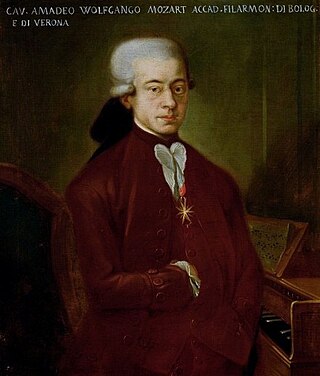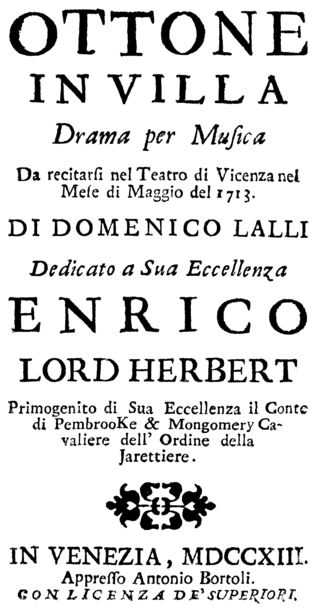
Il re pastore is an opera, K. 208, written by Wolfgang Amadeus Mozart to an Italian libretto by Metastasio, edited by Giambattista Varesco. It is an opera seria. The opera was first performed on 23 April 1775 in Salzburg in the Rittersaal of the Residenz-Theater in the palace of the Archbishop Count Hieronymus von Colloredo.

Antonio Alessandro Boncompagno Stradella was an Italian composer of the middle Baroque period. He enjoyed a dazzling career as a freelance composer, writing on commission, and collaborating with distinguished poets, producing over three hundred works in a variety of genres.

Alessandro nelle Indie is an opera seria in two acts by Giovanni Pacini to a libretto by Andrea Leone Tottola and Giovanni Schmidt, based on Alessandro nell'Indie by Pietro Metastasio. It was premiered at the Teatro di San Carlo in Naples on 29 September 1824, and had a total of 38 performances in its first season.

Ottone in villa is an opera in three acts by Antonio Vivaldi to an Italian libretto by Domenico Lalli. It was Vivaldi's first opera and premiered on 17 May 1713 at the Teatro delle Garzerie in Vicenza. Lalli's pastoral drama is set in ancient Rome and was a condensed adaptation of Francesco Maria Piccioli's satirical libretto for Carlo Pallavicino's opera Messalina (1679). However, Lalli changed several of the characters in Piccioli's libretto. Messalina became an invented character, Cleonilla. The Roman Emperor Claudius became another emperor, Otho (Ottone), who had already appeared as a protagonist in Monteverdi's L'incoronazione di Poppea (1642) and in Handel's Agrippina (1709).

Orfeo (Orpheus) is an opera in three acts, a prologue and an epilogue by the Italian composer Luigi Rossi. The libretto, by Francesco Buti, is based on the myth of Orpheus and Eurydice. Orfeo premiered at the Théâtre du Palais-Royal in Paris on 2 March 1647. It was one of the earliest operas to be staged in France.

Crispino e la comare o Il medico e la morte is an opera written collaboratively by Luigi Ricci and Federico Ricci with an Italian libretto by Francesco Maria Piave.
Il Mitridate Eupatore is an opera seria in five acts by the Italian composer Alessandro Scarlatti with a libretto by Girolamo Frigimelica Roberti. It was first performed, with the composer conducting, at the Teatro San Giovanni Grisostomo, Venice, on 5 January 1707. A failure at its premiere, Mitridate Eupatore is now considered one of the finest of Scarlatti's operas.
Tigrane, o vero L'egual impegno d'amore e di fede is an opera seria in three acts by the Italian composer Alessandro Scarlatti with a libretto by Domenico Lalli. It was first performed at the Teatro San Bartolomeo, Naples, on 16 February 1715. It is regarded as one of Scarlatti's finest operas. As well as the serious main plot, there are also comic scenes involving the servants Dorilla and Orcone.
Il trionfo dell'onore is an operatic 'commedia' in three acts by the Italian composer Alessandro Scarlatti, with a libretto by Francesco Antonio Tullio. It was first performed at the Teatro dei Fiorentini, Naples, on 26 November 1718. It is Scarlatti's only known comic opera.

Alessandro Stradella is a romantic opera in three acts composed by Friedrich von Flotow to a German libretto by "Wilhelm Friedrich". Set in Venice and the countryside near Rome, it is loosely based on the colourful life of the 17th-century Italian composer and singer Alessandro Stradella. It was first performed in its full version on 30 December 1844 at the Stadttheater in Hamburg.

Il Pompeo is a dramma per musica in three acts by composer Alessandro Scarlatti. Written in 1682 when Scarlatti was 22 years old, it was his fourth opera and first dramatic work on a serious and grand subject. The opera uses an Italian language libretto by Nicolò Minato which had previously been used by Francesco Cavalli for his 1666 opera Pompeo Magno. The work premiered at the Teatro di Palazzo Colonna in Rome on 25 January 1683.

L'honestà negli amori is a dramma per musica in 3 acts by composer Alessandro Scarlatti. Written in between 1679 and 1680 when Scarlatti was 19 years old, it was his second opera. The opera uses an Italian language libretto that was written by either D F Bernini or Domenico Filippo Contini. The work premiered at the Teatro di Palazzo Bernini in Rome on 3 February 1680. The opera was performed again in 1682 in Acquaviva delle Fonti at the Palazzo De Mari with Acquaviva laureata a serenata composed by Giovanni Cesare Netti. The opera has since been almost entirely forgotten, except as the source of the aria ‘Già il sola dal Gange’.

Una follia is a farsa in one act by composer Gaetano Donizetti. The work premiered on 15 December 1818 at the Teatro San Luca in Venice. The opera uses the same Italian-language libretto by Bartolomeo Merelli after August von Kotzebue's Der Graf von Burgund that Donizetti used for his Enrico di Borgogna a month earlier, but with different music. It was given one performance and "never performed again, and its score has never been found."
L'incoronazione di Dario is an opera in three acts composed by Giacomo Antonio Perti to an Italian libretto by Adriano Morselli. It was first performed on 13 January 1686, at the Teatro Malvezzi in Bologna. Morselli originally wrote the libretto for Domenico Freschi's opera Dario which premiered at the Teatro San Angelo in Venice in 1685. Other later uses of the libretto include Giuseppe Aldrovandini's 1705 L'incoronazione di Dario and Vivaldi's 1717 L'incoronazione di Dario.

Il borgomastro di Saardam is an 1827 melodramma giocoso in two acts by Gaetano Donizetti. The libretto, by Domenico Gilardoni, was based on the 1818 play Le bourgmestre de Sardam, ou Les deux Pierres by Mélesville, Jean-Toussaint Merle and Eugène Cantiran de Boirie. Albert Lortzing's 1837 opera Zar und Zimmermann is ultimately based, via a German translation, on the same French play. The plot concerns a famous episode in the life of Peter the Great, in which he disguised himself under an assumed name as a worker in the shipyards of Saardam, and has certain similarities to Donizetti's earlier 1-act farce Il falegname di Livonia.
Calisto Bassi was an Italian opera librettist.
Nitocri is an opera in two acts composed by Saverio Mercadante to libretto by Apostolo Zeno adapted by Lodovico Piossasco Feys. The libretto is a fictionalised account of the Egyptian queen Nitocris. The opera premiered at the Teatro Regio in Turin on 26 December 1824.
Giovanni Filippo Apolloni was an Italian poet and librettist. Born in Arezzo, he has sometimes been referred to as "Giovanni Apollonio Apolloni", but the second given name is spurious. He served as the court poet to Ferdinand Charles, Archduke of Austria at Innsbruck form 1653 until 1659. On his return to Italy he entered the service of Cardinal Volumnio Bandinelli. After Bandinelli's death in 1667 Appolloni was in the service of the Chigi family in Rome and Siena for the rest of his life. He wrote the librettos for a number of operas, the most well-known of which were Antonio Cesti's L'Argia and La Dori, as well as several oratorios and the texts for cantatas by both Cesti and Alessandro Stradella.